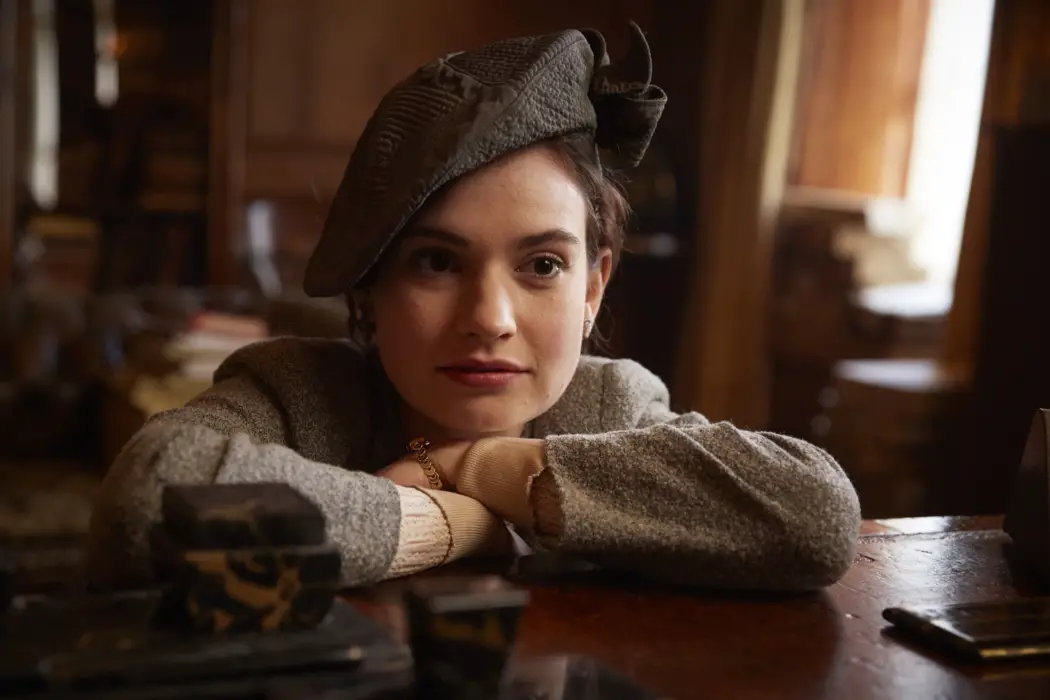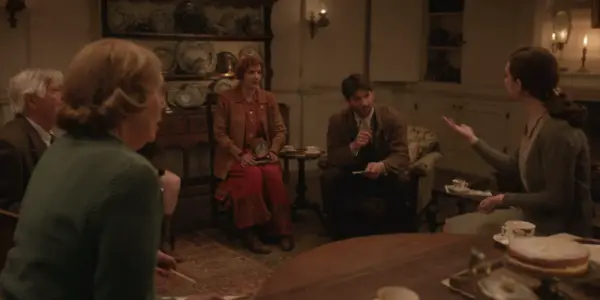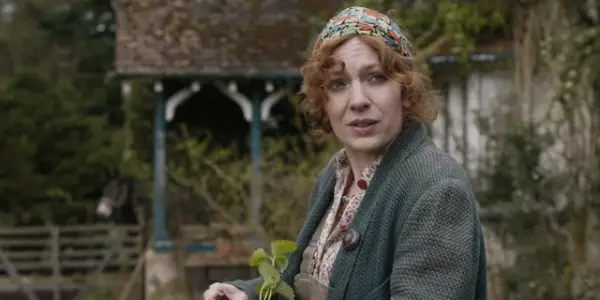THE GUERNSEY LITERARY AND POTATO PEEL PIE SOCIETY: A Gentle Yet Moving Heritage Romance

Zoe Crombie is a Film Studies student from Lancaster University,…
Personally, I still haven’t made my mind up on heritage films. On the one hand, they can feel like these lavish escapist fantasies that transport the viewer to a simpler time, or explore societal concepts gone but that can inform our current experiences.
On the other hand, they can sometimes feel dull and irrelevant, and also often promote conservative, revisionist ideas I and many others don’t personally agree with. For me, The Guernsey Literary and Potato Peel Pie Society (a bit of a mouthful) fell a little into both camps, but despite this, I found myself fairly surprised and absorbed by it.
Premise and Performances
Just following World War II, struggling author Juliet (Lily James) travels to the island of Guernsey to meet members of the titular society who used literature as a way of dealing with their wartime struggles. On the way, she makes new friends, discovers new romance beyond her dashing American fiancé, and uncovers some dark secrets that the society sought to keep hidden forever.
Though you may guess some plot developments early on, particularly concerning the romantic subplots, the main thrust of the story is the sad tale of what happened in Guernsey before Juliet arrived, and how the past will affect the present – a plot-line that kept me guessing incorrectly what would happen next.

The most charming aspect of the film is the colourful cast of characters on Guernsey, who are mostly upbeat yet haunted in varying and complex ways from the Nazi occupation several years prior. The casting of various actors from well known UK TV shows (Katherine Parkinson from The I.T. Crowd and Penelope Wilton from Doctor Who) also endeared the characters somewhat more to me, perhaps unfairly.
However, similarly to her delightful and charismatic performance in Mamma Mia! Here We Go Again, Lily James carries the majority of the film brilliantly, coming across simultaneously as naive but emotionally mature and believable. As the strongest link of multiple films this year, I hope her star will continue to rise.
The Look Of Romance
Whilst the cinematography was serviceable and did a decent job of highlighting various symbols in the mise-en-scène, and the score felt similarly functional, it was the costuming and set design that truly established the aesthetic luxury of the film. From the glamorous parties in London to the ramshackle cottages of Guernsey, this level of visual detail helped to elevate the film and contribute to the largely escapist feel.

However, the casting of comedy actors like Parkinson didn’t help with some of the tonal issues I had with the film. Whilst the aesthetic was symbolic and romantic, some of the line delivery from the supporting cast felt more comedic, and the overall plot may have benefitted from a more gritty tone. As well as this, although I agreed with the overall message of literature being necessary for emotional pathos and maturity, I found some of the politics of a twist late in the runtime a little questionable, with the film almost treating Nazis as simply the German side of the war as with WWI.
A Small Budget Studio Success
Regardless of these criticisms though, I found myself immersed in the film more so than any other recently, and whilst I appreciate the Brechtian approach of other films this year like Isle of Dogs and Ghost Stories, I do appreciate the value of emotional escapism as advocated for in the plot. Even with Avengers: Infinity War audibly raging on in the adjacent screen when I saw a theatrical release back in May, I still couldn’t help feeling drawn into the Literary and Potato Peel Pie society and their trials and tribulations.
In fact, the queues of people outside for Infinity War alongside the noise encouraged me to be grateful for smaller scale films like this, and the range of stories that they allow for rather than what is simply most marketable. Not because I dislike Infinity War, but because I would be sad to see the film industry simply become an endless stream of similar blockbusters.
Conclusion: The Guernsey Literary And Potato Peel Pie Society
Now it has appeared on Netflix, I would highly recommend The Guernsey Literary And Potato Peel Pie Society whilst curled up with a blanket and a cup of tea on a dull afternoon. It won’t shock or challenge you, but it will give you a sense of easygoing warmth; in a word, this film is nice.
What do you think? Will you be watching this on Netflix? Let me know in the comments!
The Guernsey Literary And Potato Peel Pie Society was released on Netflix on August 10, 2018.
Does content like this matter to you?
Become a Member and support film journalism. Unlock access to all of Film Inquiry`s great articles. Join a community of like-minded readers who are passionate about cinema - get access to our private members Network, give back to independent filmmakers, and more.
Zoe Crombie is a Film Studies student from Lancaster University, who has been writing for Film Inquiry since May 2018 as well as at her own site Obsess Reviews. She is a big fan of Studio Ghibli and The Marx Brothers, but is willing to watch anything and everything.












